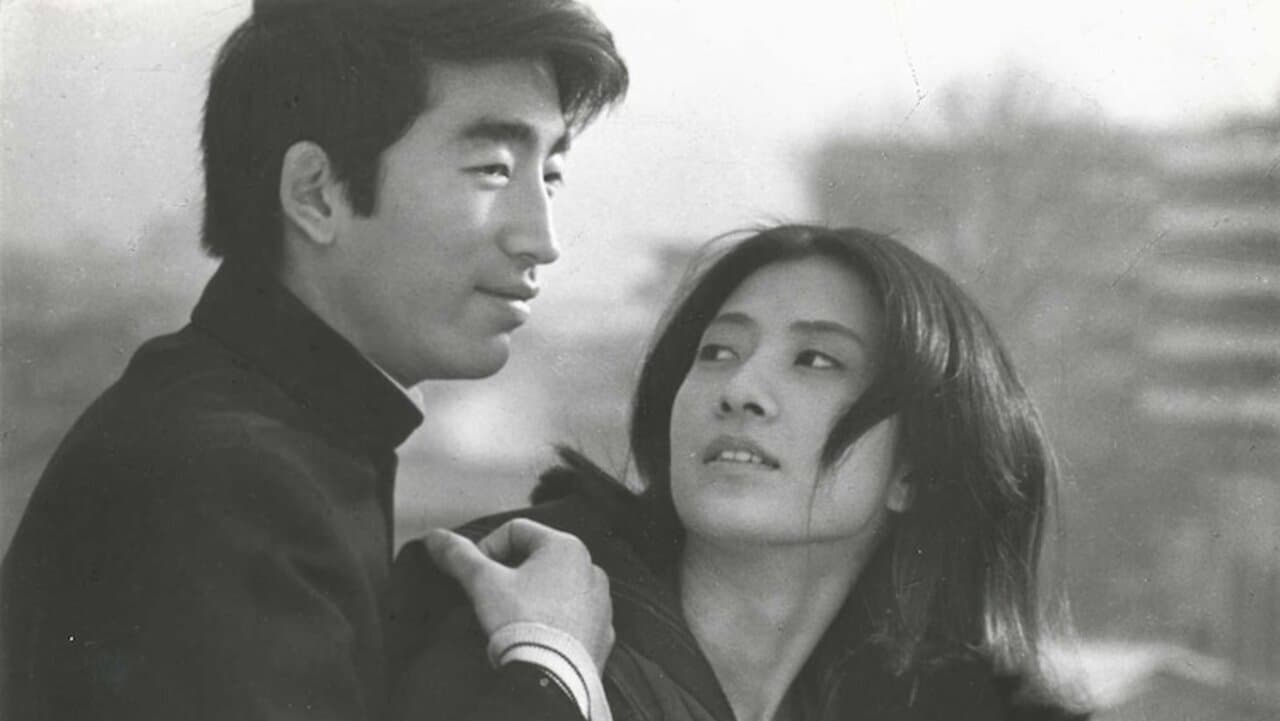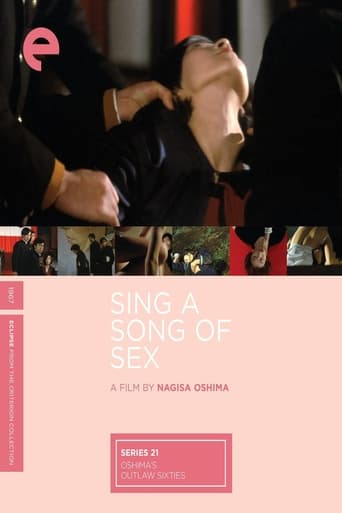



What makes it different from others?
Am I Missing Something?
This movie was so-so. It had it's moments, but wasn't the greatest.
View MoreThis is a dark and sometimes deeply uncomfortable drama
View MoreSing a Song of Sex, or 'A Treatise on Japanese Bawdy Songs' (frankly I can't really tell you which title is better) is done by a filmmaker who has a kind of poker face, and only reveals his hand just slightly half-way through, so that by the end you really feel the collective punch of his full show of cards. It's a story that has a melancholy air to it, but suffused with a captivating sense of irony and self-consciousness ultimately with itself. Its main characters really couldn't give a damn, except to get laid, and in a way it's like the twisted older cousin of an American Pie movie... only without the bawdy jokes and replaced with bawdy songs, I guess.This film takes a look at aimless youths finishing high school and getting ready for college who after the sudden death of a teacher wander about singing the same song of sex (going through ten scenarios through the song), and imagining raping a girl in a classroom. There is also a girlfriend of sorts (or two) who follow with their pack, and at one point they come across a group singing protest songs in English. But mostly not a whole lot "happens" except that Oshima gets precisely and dangerously into the minds of his politically conscious - or un-conscious- minds. What do these four boys think about? What's their plan or play? What about the one student who may or may not (or not likely) have been able to save the teacher's life? The style starts out very realistically, which opens it up for how bizarre it gets later on since nothing seems too self-conscious, but everything has on another air of fantasy to it. The last ten minutes gets especially brutal, though all with a slow and uncomfortably surreal boil (by uncomfortable I mean as a compliment). It's a mature, super-black comic work by a director who knows how to put the camera in positions that make his characters more than just figures in a frame but figures set against the backdrops they're in (snow, city buildings, bridges, crowds, the empty school room).
View MoreI'm slowly suspecting that music will continue to play a large part in the festival films presented, as thus far we got treated to the jazzy tunes in Good for Nothing, the punk rock Fish Story (still a earworm), and now a slew of Japanese folk songs with some recognizable Western evergreens peppering the soundtrack of Sing a Song of Sex, which is also known by its other title Treatise on Japanese Bawdy Songs, and boy are they bawdy when left to the devices of the singer to improvise.Directed by Nagisa Oshima outside of the studio system, Sing a Song of Sex as the name implies has as a chief plot element a number of bawdy songs, as explained by Otake (Juzo Itami) to be an outlet for expression by the oppressed masses who have no other avenue to describe their misery, other than to sing about the pleasures of sex and desire, although a number of the lyrics tell of stories about the poor and the things they have to resort to for a living. It's quite clear that Oshima crafted a pointed commentary of society at the time (since he's largely involved in various student demonstrations), through the discussions between Otake and his group of co-ed students as they bar hop after the student examinations, the girls truly being enamoured by their handsome teacher, while the boys just tagging along because of their fantasy in bedding some, if not all, of their female schoolmates.Like Good for Nothing, these four male students do seem like the usual teenage idle bunch, perhaps so because the examinations are just over, and they're looking for some sort of release and letting their hair down, one of which is to hit the town painting it red, and spend time watching the latest pinku film. Why not, for all hot blooded males, that the topic of sex will pop up inevitably when they talk crap and thrash talk about women and their individual sexual fantasies, that ironically, they do not know how to act around one, especially when they start boasting about what they intend to do with the school flower Fujiwara (Kazuko Tajima) whom they all call "469" based on her examination hall seating assignment.And the way Oshima had presented this lustful desire had a ring of Nolan's Inception to it, that it deals with a shared fantasy dreamscape where all of them exist and can bear witness to one another's actions in his realm, but instead of falling into deep sleep and needing a kick to wake up, here it goes a one up in being able to do while day-dreaming, therein eliminating the risk of falling into limbo. Of course there's no idea to be planted, only idle boasts of what they're capable of which will have its bluff called later on in the film. This section of the film was one of my favourites for its conceptual execution, but the subject matter will surely disturb.Like the films from the 60s I've seen thus far, the cinematography and the landscapes are quite the sight to behold, especially those wide shots of a wintry landscape, and the few scenes of the downtown city and subway which seem quite quaintly familiar. We follow the four friends, of whom the leader of the pack Nakamura (Ichiro Araki) stands out for having more to do in the film, and responsible for the death of Otake due to his inaction, a preventable death by a silly mistake on Otake's part if you will, but with irresponsible youths, there's always no due consideration where their actions or inactions will take them in the future.The second half of the film splits its narrative into two tangents, leading up to the realm of the strange. In the first, we follow Nakamura to the home of Otake's sweetheart Tanigawa (Akiko Koyama)where Nakamura is contemplating how to break the news of his responsibility to her, and it becomes a guilt trip enactment of what happened. The second follows the rest of his friends as they seek out Fujiwara at an anti-Vietnam war movement, also to apologize to her for their virtual violation, but get sort of involved and caught up in the song-singing rallying of the students, and when both threads merge for the finale, it's one really warped mix of lust and desire against a quick folktale history of that between Korea and Japan, taking place inside a pyramid shaped building.Far out. Hoi hoi!
View MoreThis movie is about four male high school students who took their university entrance exams and are just hanging around mostly. They have a connection with their teacher Mr. Otake and they go out drinking with him and 3 female classmates. Mr. Otake starts singing a bawdy Japanese folk song, a song sung throughout the film by the male characters. One night after heavy drinking, Otake pays for the girls and guys to stay at an inn since the trains have stopped running. Otake puts on the gas stove, falls drunkenly asleep and accidentally kills himself by poisoning. The girls are inconsolable, the guys nonchalant. The guys become obsessed with a fellow classmate, mostly known by her seat number 469. The film goes from there, with meeting her, meeting Otake's mistress and singing the song. This take on disenfranchised youth in Tokyo is very effective. Director Oshima Nagisa is well known for pushing the envelope (he directed the notorious "In The Realm Of The Senses")and this character study is interesting, with good young actors in the pivotal roles. The movie title notwithstanding, this is not a pornographic film, it has very little nudity and very little violence. Its just a story of attitude, indifference and, if not fear, wariness of what lies ahead. I liked the pacing in this film and generally feel you'll like it if you like Japanese drama. Not perfect, but an interesting film from a maverick director who has no problem making you think.
View MoreFour Japanese high junior school boys are obsessed with sex. They encounter their teacher out drinking and he sings/teaches a bawdy song about whose permission you need to ask before sleeping with a girl. "Sleeping with" means essentially raping. The drunk teacher accidentally dies, kicking off a more abstract round of imaginary acts of the quartet, beginning with the rape of their female teacher in class while other students placidly watch. They incessantly chat about and imagine what they would do with their classmates.The leader of the gang ties up with the teacher's girlfriend and that's when some of the most impressive imagery appears, during a party-funeral peppered with bawdy songs. The casket is draped in an American flag. The funeral devolves into a battle between those songs and religious ones, mirroring a battle between Japan and the US (or alternatively Korea). I'm uncharacteristically explaining this because you probably will not ever the film.The last ten minutes is a lecture in the class by the girlfriend about the honor of the Japanese people while the students hesitantly attempt the much discussed rape of the girl in seat 468. The lead student kills the girl to prevent the rape.I came to this because I valued my experience with "All About Lily Chou Chou," and wanted to experience much the same thing in a more vintage original. It lacks the power I expected. Stick with "Lily Chou."It is much more complex but less effective than "Realm of the Senses" shot a decade later.Ted's Evaluation -- 2 of 3: Has some interesting elements.
View More